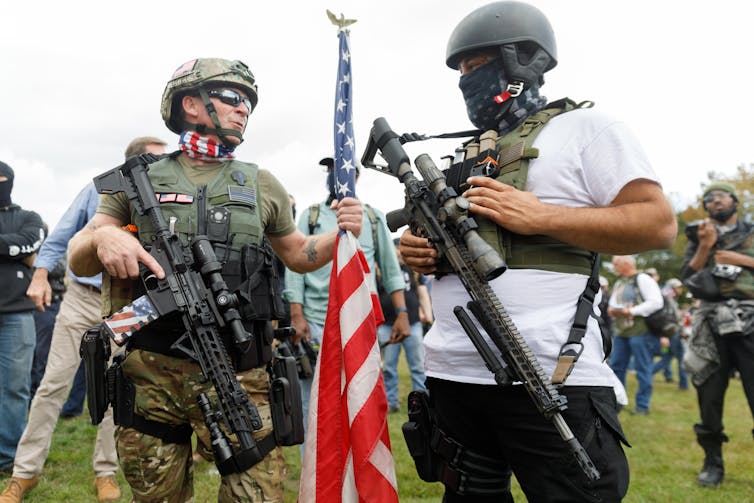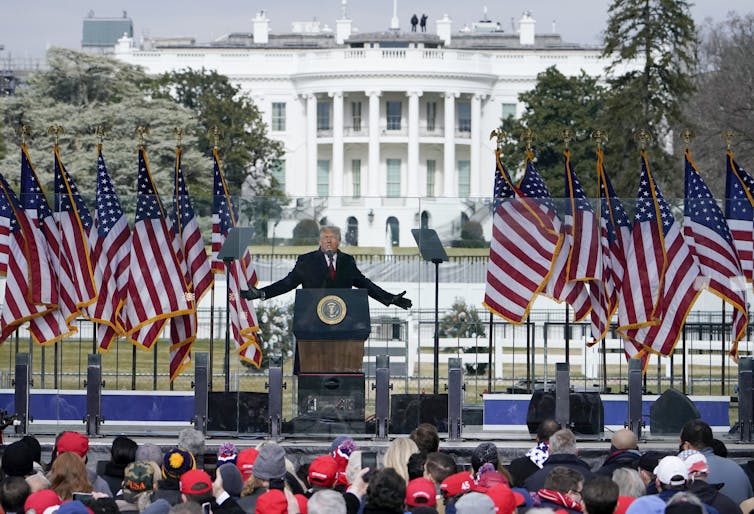Why is it so difficult to fight domestic terrorism? 6 experts share their thoughts
- Written by Mikkel Dack, Assistant Professor of History, Research Director of Rowan Center for the Study of the Holocaust, Genocide, and Human Rights, Rowan University
The United States’ first-ever national strategy for countering domestic terrorism[1] calls for better information-sharing among law enforcement agencies and efforts to prevent extremist groups from recruiting online[2]. Published in June 2021, the document is bolstered by the recent introduction of several counterterrorism bills[3]. The Department of Homeland Security has earmarked hundreds of millions of dollars[4] in funding to prevent attacks.
After two decades of successive administrations[5] focusing almost exclusively on the foreign militant Islamist threat, it appears that domestic far-right extremism, especially white supremacy and militia violence, is now at the top of the national security agenda. However, far-right political violence is not new, nor are coordinated efforts to eliminate it.
America has a long history of failed anti-terrorism programs, from the much-neglected Ku Klux Klan Act of 1871[6] to the quick and forceful legislative response[7] to the Oklahoma City bombing in 1995.
Experts are concerned that this latest plan will not represent a new direction, but rather a continuation of past counterterrorism efforts[8], including violations of citizens’ rights[9] and discrimination against people of certain ethnic or religious backgrounds.
I, Mikkel Dack[10], am a historian of Germany who studies far-right violence and counter-radicalization projects in that country after World War II. But while what Germany called “denazification[11]” does hold many lessons for today, the American context is vastly different from postwar Europe. So I asked a panel of counterterrorism experts what they see as the greatest practical challenges to fighting far-right violent extremism in the United States.
[Get The Conversation’s most important politics headlines, in our Politics Weekly newsletter[12].]
Gary LaFree[13], University of Maryland
Excluding the coordinated attacks of 9/11, domestic right-wing terrorism has caused more harm[14] to American citizens at home than radical Islamist attacks over the past two decades.
However, the urge to develop immediate legislation to confront the threat of domestic terrorism could cause trouble. Domestic attacks like the one that occurred on Jan. 6, 2021[15] are rare, yet they encourage immediate and far-reaching responses that are not easily rolled back.
The USA PATRIOT Act[16] of 2001, which sailed through Congress in just three days after the 9/11 attacks, addressed very different circumstances than those involved in domestic extremism.
In particular, one provision of the Patriot Act criminalizes anyone who raises money, supplies propaganda or otherwise provides what the law calls “material support” to terrorist organizations, even if the person has no other connections to terrorism. If applied to U.S. citizens supporting groups based in the U.S., that would likely raise huge legal challenges under the First Amendment’s protection of freedom of assembly and association.
In addition, it’s politically complicated to even consider labeling domestic groups as terrorist organizations, as seen in the fractious efforts to decide whether antifa[17] or the Proud Boys[18] are terrorist organizations[19].
 Two members of the Proud Boys wear military-like gear at a rally in Oregon in September 2020.
John Rudoff/Anadolu Agency via Getty Images[20]
Two members of the Proud Boys wear military-like gear at a rally in Oregon in September 2020.
John Rudoff/Anadolu Agency via Getty Images[20]
Following (Donald) Trump’s election loss, some conservative politicians have rushed to appear ideologically consistent with the former president, including his allusions of support[21] for the far-right. Many make statements[22] that tacitly approve[23] of violence[24] in the service[25] of political objectives.
These politicians tend to avoid overt directives, providing them with plausible deniability should violence occur. But when statements reach millions of people, at least some will interpret them as orders[26].
The difficulty posed by this phenomenon, called “stochastic terrorism[27],” is couched in the speech protections of the First Amendment and judicial precedents. In 1969, the Supreme Court decided that speech in support of terrorism[28] is protected by the First Amendment unless it incites violence immediately. This renders the link between speech and violence subjective.
In some cases, politicians have been prosecuted for influencing extremist violence[29]. In others, the speaker avoided punishment[30]. Because implied support for violent extremism remains only subjectively punishable, some politicians will likely continue to make implicit statements that increase the likelihood of right-wing domestic terrorism.
 Right-wing politicians, including former President Donald Trump, at times make statements that seem right on the line between free speech and incitement to violence.
AP Photo/Jacquelyn Martin[31]
Right-wing politicians, including former President Donald Trump, at times make statements that seem right on the line between free speech and incitement to violence.
AP Photo/Jacquelyn Martin[31]
John Horgan[32], Georgia State University
On July 19, 2021, 38-year-old Florida resident Paul Hodgkins received an eight-month prison sentence[33] for his role in the Jan. 6 attack on the U.S. Capitol. His conviction, and dozens more expected to follow[34], raises questions of what will happen to them while in prison – and after their release.
In the past, neither the national security agencies nor the Department of Justice’s Bureau of Prisons has seriously considered how to handle extremist inmates while they serve their sentences, nor how to offer them a road to reintegration with the country they attacked, or planned to.
Deradicalization[35] efforts to address the increasingly diverse population of homegrown terrorists could include psychological counseling and restorative justice[36]. The benefits could extend beyond the decreased risk of future extremism, to rebuilding trust in government agencies and communities torn apart by political and cultural discord[37].
 Former Boko Haram fighters mark the end of their deradicalization training in Niger in 2019.
Boureima Hama/AFP via Getty Images[38]
Former Boko Haram fighters mark the end of their deradicalization training in Niger in 2019.
Boureima Hama/AFP via Getty Images[38]
The problem of domestic terrorism is not just something to be tackled by the government, but is a fundamental challenge within government agencies. Radicalization is particularly dangerous within law enforcement[39] and the military[40], whose members are armed and hold positions of power in society.
Screening military and other government officials for ties to extremist groups[41] is key to the success of the other components of the White House strategy. But most government background checks rely heavily on friends and family members. That system will not be reliable if many of those people themselves have deep distrust in the government and may be radicalized or otherwise misguided by disinformation[42].
Vetting systems could be adapted to include questions that will elicit information about radicalism. In addition, government agencies could require job candidates – or existing employees – to disclose their own connections to extremist groups and ideologies, coupled with penalties for failing to do so.
References
- ^ national strategy for countering domestic terrorism (www.nytimes.com)
- ^ prevent extremist groups from recruiting online (www.whitehouse.gov)
- ^ counterterrorism bills (www.congress.gov)
- ^ hundreds of millions of dollars (www.nytimes.com)
- ^ successive administrations (www.ict.org.il)
- ^ Ku Klux Klan Act of 1871 (www.cnn.com)
- ^ legislative response (www.nytimes.com)
- ^ past counterterrorism efforts (theconversation.com)
- ^ violations of citizens’ rights (www.aclu.org)
- ^ Mikkel Dack (scholar.google.com)
- ^ denazification (www.alliiertenmuseum.de)
- ^ Get The Conversation’s most important politics headlines, in our Politics Weekly newsletter (theconversation.com)
- ^ Gary LaFree (scholar.google.com)
- ^ more harm (fas.org)
- ^ Jan. 6, 2021 (theconversation.com)
- ^ USA PATRIOT Act (bja.ojp.gov)
- ^ antifa (theconversation.com)
- ^ Proud Boys (www.businessinsider.com)
- ^ terrorist organizations (www.npr.org)
- ^ John Rudoff/Anadolu Agency via Getty Images (www.gettyimages.com)
- ^ allusions of support (www.cbsnews.com)
- ^ statements (www.al.com)
- ^ approve (www.nytimes.com)
- ^ violence (www.forbes.com)
- ^ the service (www.washingtonpost.com)
- ^ interpret them as orders (www.cnbc.com)
- ^ stochastic terrorism (www.wired.com)
- ^ speech in support of terrorism (supreme.justia.com)
- ^ influencing extremist violence (houserepublicans.wa.gov)
- ^ avoided punishment (www.nytimes.com)
- ^ AP Photo/Jacquelyn Martin (newsroom.ap.org)
- ^ John Horgan (scholar.google.com)
- ^ eight-month prison sentence (www.npr.org)
- ^ expected to follow (www.cbsnews.com)
- ^ Deradicalization (www.resolvenet.org)
- ^ psychological counseling and restorative justice (www.usip.org)
- ^ communities torn apart by political and cultural discord (www.resolvenet.org)
- ^ Boureima Hama/AFP via Getty Images (www.gettyimages.com)
- ^ law enforcement (www.brennancenter.org)
- ^ military (www.npr.org)
- ^ ties to extremist groups (theconversation.com)
- ^ disinformation (www.npr.org)

















